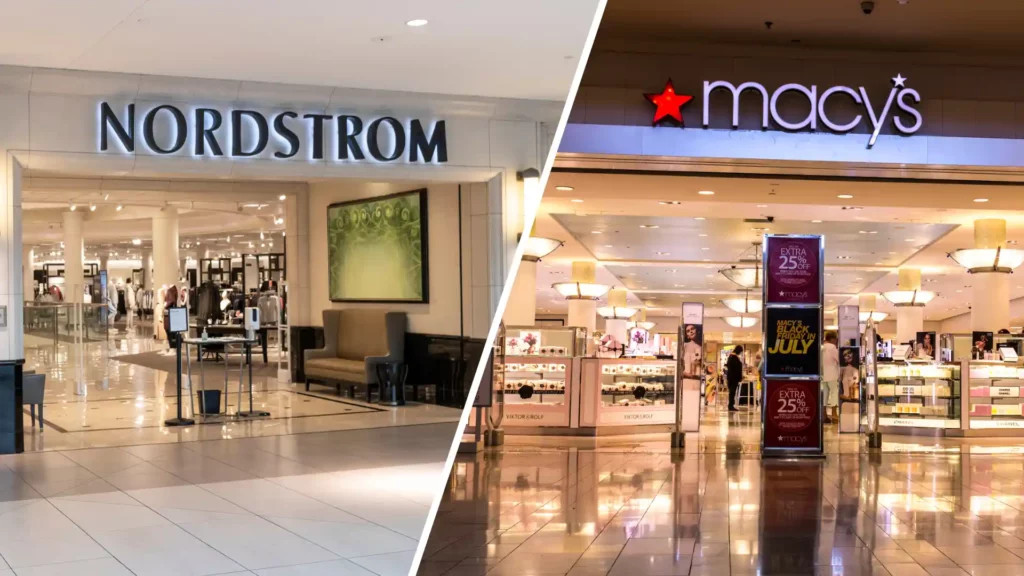Private entities or hedge funds could finally own America’s top publicly traded departmental store chains, drastically altering the retail environment in the US.
According to data collected by Dealogic ( a financial marketing platform), investments in retail and consumer industries made up barely 7% of the $2.6 trillion in US private equity deal activity over the last ten years, as opposed to roughly 15% of the $1.7 trillion total over the previous ten years. However, the acquisitions of Macy’s and Nordstrom may alter the balance of power and revive the idea of private ownership of significant US retailers.
For example, in its latest attempt to go private, the founding family of Nordstrom (an American luxury department) wants to maintain ownership of the chain but is not interested in the burden of disclosing quarterly results while it works out a plan.
Nordstrom Expands Rack, Macy’s Focuses Solely on Luxury
Executives from Nordstrom informed investors during a March 5 earnings call that the company opened 19 new Nordstrom Rack locations in 2023 and intends to open 22 more in 2024.
Rivals like Macy’s, which is eliminating roughly 150 Macy’s sites but just announced plans to create at least 45 new upmarket Bloomingdale’s and Bluemercury retail stores in the next three years, are set at odds with Nordstrom’s sister brand Rack because of its rapid expansion.
Macy’s CEO Tony Spring also informed investors on a call following the company’s February earnings that the move will enable Macy’s to concentrate on expanding its higher-performing luxury brands.
In March, Nordstrom’s CFO, Cathy Smith, informed investors that the business intends to increase the number of its bargain Rack stores to “grow where the market is growing.”
Based on its latest financial reports, the business runs 258 Nordstrom Rack locations and 93 full-price Nordstrom stores. The growth occurred at a time when departmental store chains were struggling with weak customer demand and fierce competition from discount stores like TJX and Burlington Stores.
Nordstrom’s Rack Expansion Targets Off-Mall Shopping
Nordstrom’s entry into its discount Rack business is to increase its market share in shopping centres other than malls, where Rack stores are usually found, by attracting some lower-class customers. David Swartz, an analyst at Morningstar, a financial firm based in Chicago, US, stated that Nordstrom, being a publicly traded firm, has its own drawbacks since it was always under observation. People counted on it to hit targets and turn up big statistics. But that has only sometimes been the case.
While sales at Rack stores increased 14.6% year over year during the holiday shopping season, compared to a 3% fall at full-price flagship Nordstrom, the firm battled with overstocking during the pandemic. Still, Rack stores have been a bright spot in previous quarters. Attempts to provide more affordable apparel and footwear to specific Rack locations could have been more successful in drawing customers. Swartz also stated that Nordstrom cannot make both of these businesses work at the same time.
Key Differences in Nordstrom and Macy’s Ownership Battles
Executives have now added more well-known brands to Rack’s selection, including Cole Haan and Ugg. Erik Nordstrom, Nordstrom’s CEO, also told investors last month that they knew that offering top-notch products at competitive pricing is what their clients desire.
As early as 2022, when Mexican departmental store El Puerto de Liverpool acquired a nearly 10% share, Nordstrom activated the so-called poison pill, which experts interpreted as yet another indication that the family still wants to retain control over the company. Macy’s, on the other hand, said that It would provide investment firms like Arkhouse and Brigade Capital access to its books, potentially advancing their $6.6 billion takeover offer for the US departmental store operator. Such due diligence would allow Arkhouse and Brigade to secure debt obligations to finance the transaction.
A reliable source stated that the major difference is that Nordstrom goes private while Macy’s faces a hostile, unsolicited bid. The source also mentioned that Macy’s is a better operator with lesser leverage than Nordstrom. Hence, it’s easier to finance.
